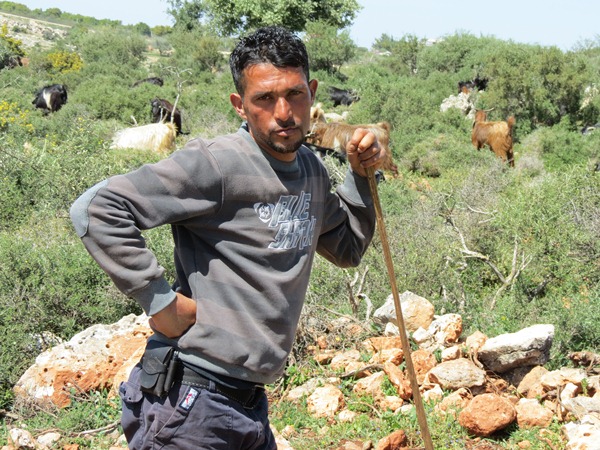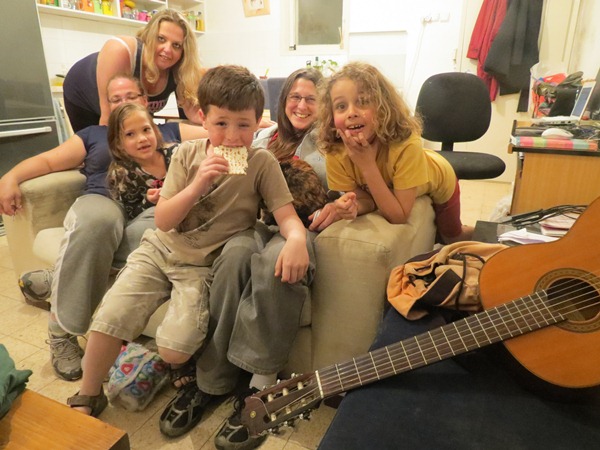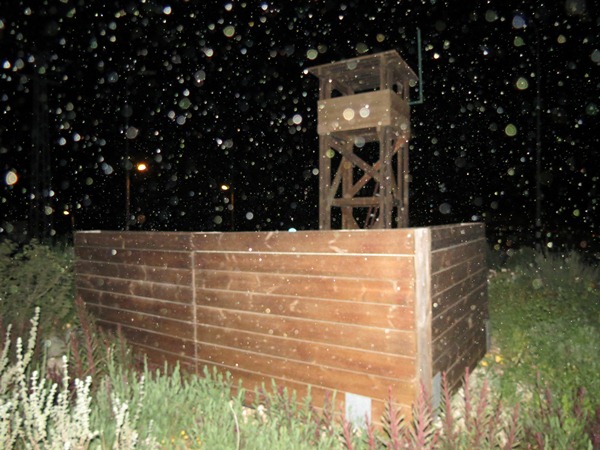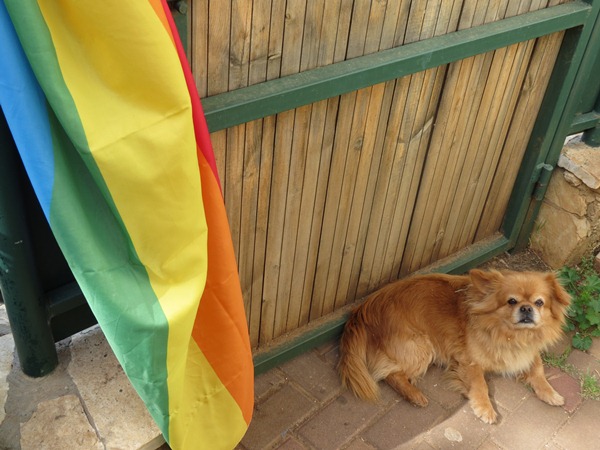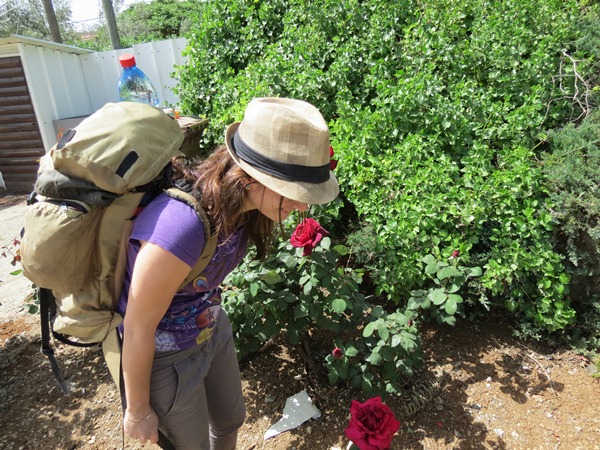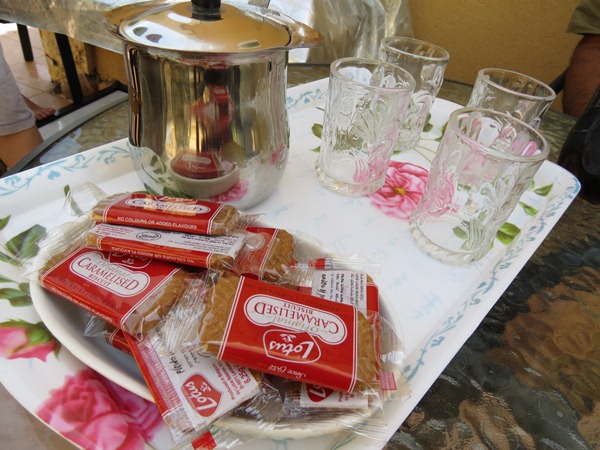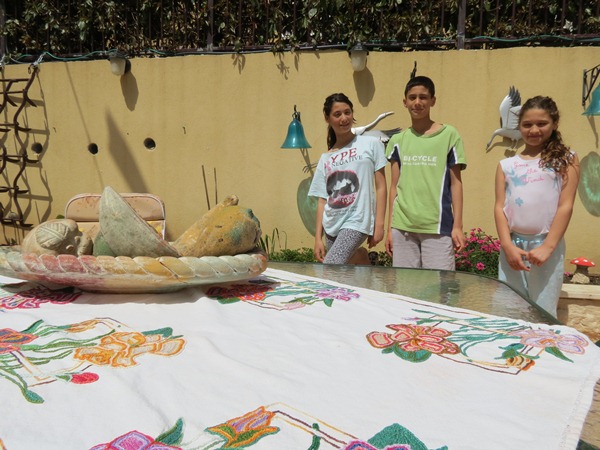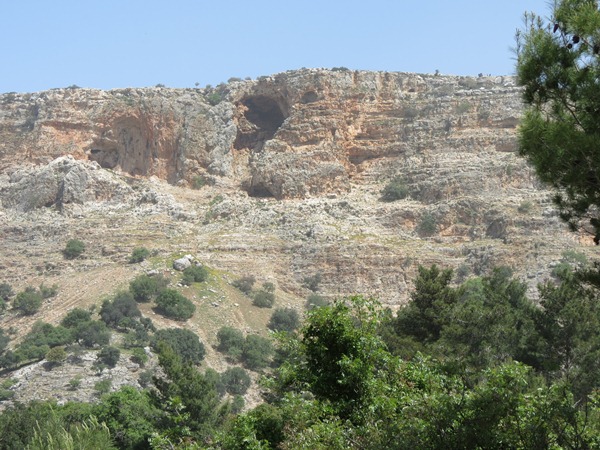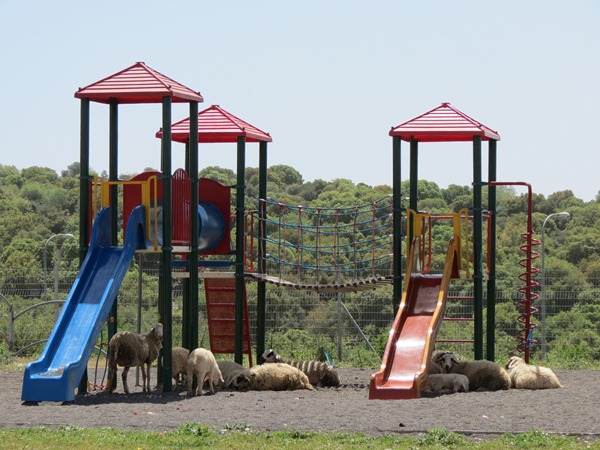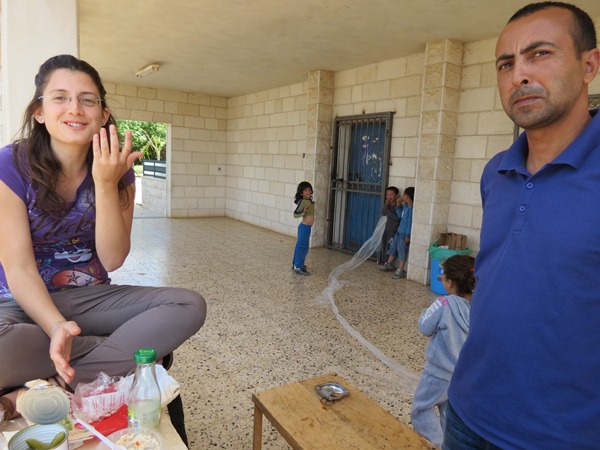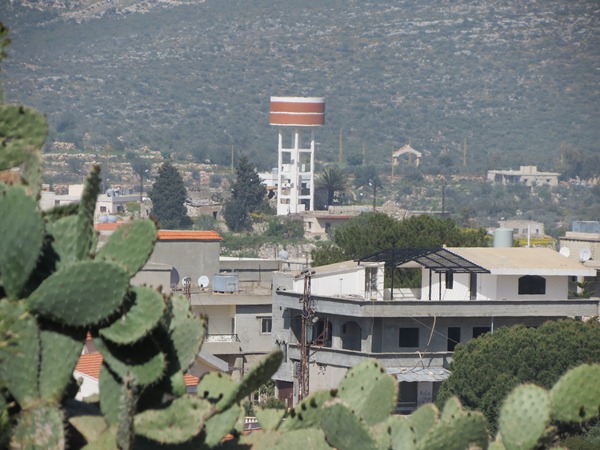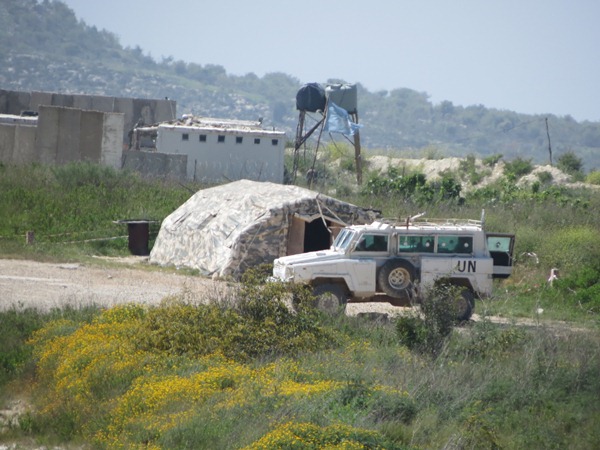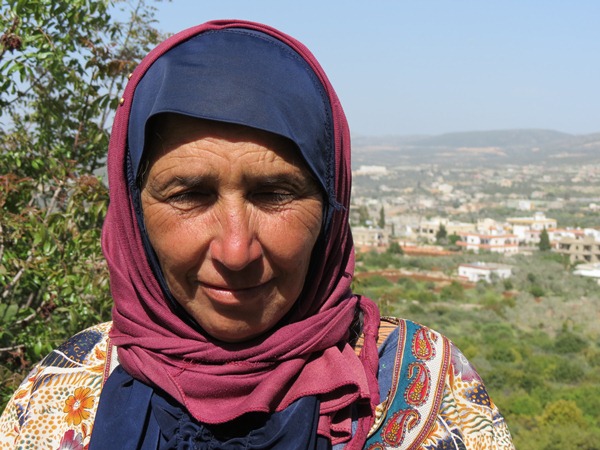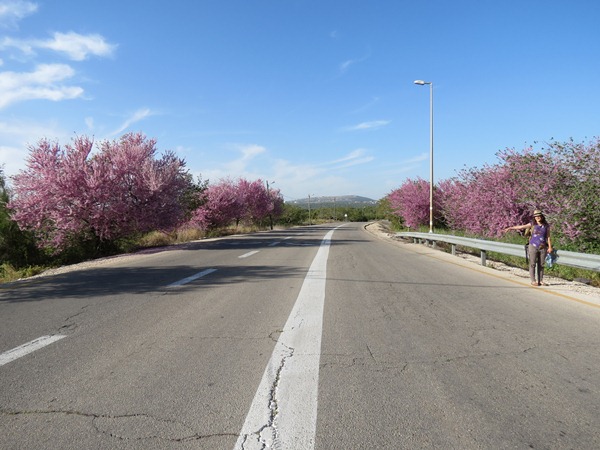While meeting Nasrallah’s next door neighbors in Hanita, Ya’ara and Arab Al Aramshe, I can’t help but ponder a very basic concept.
As soon as I reach Hanita I know that I’m going to like it. This isn’t to be taken for granted. I have a certain difficulty with places that appear to be in the open countryside while being in fact half enclosed by an electric fence. Hanita is such a place. The point at which I finally managed to distance myself from the border fence is where that fence begins to curve around the northern kibbutz, keeping it inside Israel, but only just.
Like every kibbutz, Hanita is also surrounded by its own peripheral fence, which adds to my claustrophobia, but like every kibbutz it is somehow centered around a lawn, and there’s a bunch of easygoing folk sitting on that lawn today. The view is fantastic. Hanita’s elevation provides it with a panorama of the entire Galilee (but offers no Lebanese vistas, since a taller range stretches to the north, spiked with the border’s communication towers).
The one thing about beauty, though, is you can’t eat it, and I need dinner. Kibbuzim are equipped with convenience stores, but although Hanita has become mostly privatized, its store still accepts no cash, only member credit.
I step back into the fresh highland air contemplating my next step. Across the lawn is the dining room. I approach the women and kids who sat there a moment ago and now stood up to leave, and ask whether the right to dine with members can be purchased. “I’m not sure,” one woman said, “But in any case the dining room only serves lunch.” She then invites me over for dinner. My initial sense of Hanita appears to have been on point.
The woman’s name is Sivan, and she lives on the kibbutz with her partner Osnat and their two children from previous relationships, Ella and Ben. Their friend Yael is also over with her son Zohar. Add a guitar and you have a wonderful environment to recover after nearly being shot by soldiers.
Osnat works at the regional council, and I ask her about some of the neighboring communities. Is it true that a moshav called Ya’ara is shared by Jews and Bedouins? “It is,” she confirms, “and since they only have one kindergarten and it’s a Jewish-religious one, the Bedouin kids go there too and learn all about how to live as proper little Jews. I was there when they celebrated Purim, just a month ago, and saw all the Bedouin kids in costumes.”
Another rumor had to be verified: “Is it true that the Bedouin village of Arab al Aramshe is split by the border fence, with members of the tribe living on both its sides?
Again she confirms. “They cross the fence all the time, back and forth.”
“Cross the fence? How? it’s electric.”
“They just do.”
“But how do they ‘just do’? Do they dig tunnels? Do they simply step through, like the android in ‘Terminator 2’?”
“They just cross the fence.”
She likes being mysterious, but she does give me the number of a contact person in the village, so I can find all out for myself tomorrow.
Meanwhile Yael offers me a bed in her house, and as we head there I stop to shoot a little monument that tells of Hanita’s beginnings. In the late 30s a number of new Jewish settlements were founded on the very outskirts of Palestine. Zionist leaders sensed that proper sovereignty was nigh, and sought to align the future state’s borders as closely as possible with those of the British mandate. Hostilities with the Arabs were high at the time, and a new model for settling was conjured: First a tower and a wooden fence were erected, then everything else.
For some reason my photo of the monument recalling those days comes out strange, as if a torrent of snow was falling over Hanita, or the milky way came down to blanket it with stars.
I once read a short story that told of an old lady who wouldn’t leave her home near Chernobyl. Both her daughter and the authorities urged her to do so, but she resisted. Not being able to see the radiation, she refused to believe it existed. Finally her daughter showed her photos she took of her sitting at the kitchen table. They all contained millions of tiny dots, as though very fine snow was falling in side the house. The mother became terrified and agreed to leave.
Hanita is not Chernobyl, but the allegory fits. There is something misleading about the perfect peace here. The border is not only tense, it is flammable. Missiles have been known to fall here every few years, and missiles are only the physical manifestation of a bizarre reality, which we all seem to somehow accept.
I wake up in Yael’s sweet house, with its books on Buddhist thought and fridge packed with vegan food. Zohar is watching cartoons on TV and eating matzo with chocolate spread. His mother is offering me a lift to Shlomi, where my dear friend Adi is planning to team up with me for two days of the journey. We step out of the yard through a gate charmed by a rainbow flag.
Adi is a poet and a student of cinema at Tel Aviv University, who makes her living doing internet work for a large health provider. As soon as we leave Shlomi’s rather gritty center, she literally stops to smell the flowers.
This habit of hers counts for our rather fresh friendship. Love for the beauty this life has to offer led her to a poetry festival in the central Negev, where we met. Later she invited Ruthie and I to celebrate Nowruz in her apartment. Being half descended from Iranian Jews, Adi took the opportunity to fill her house with apples, golden coins, garlic, stories and good food. A few days later I told her of my round trip plan and suggested she may be able to appreciate a day or two of it.
We hitchhike to Ya’ara, a three-minute drive to the east, and quickly find its Bedouin neighborhood. Israel’s moshavim are rural settlements that are distinguished from kibbutzim by their non-communal beginnings and that are Jewish by definition. This is what distinguishes them from villages, since the word village is used in Israel exclusively to describe Arabic speaking communities, be they Christian, Muslim, Druze or all of the above.
I can’t think of a single other example of a mixed moshav. A mixed moshav isn’t considered normal, while the complete segregation of the countryside is. Indeed, the Knesset recently passed the so called “Committee Law,” allowing municipalities to deny individuals and families the right to purchase, rent or build property within their area of jurisdiction, based on the (often racist) decision of a committee appointed by the town council. So far this law wasn’t in demand. The status quo maintained itself. Now, however, the bloody Arabs began rearing their ugly heads, making money and moving into attractive communities, which calls for a strong hand.
How did Ya’ara beat the status quo so far? We need to ask a local, which means we need to speak with a local. One house in the neighborhood, a stucco villa, recalls the architectural choices of Jewish-Israeli moshavniks even more so than the others. There’s a lady in the yard. We step over and ask her permission to photograph. Within seconds she invites us for coffee and the family is summoned.
We meet Mahmoud and Tahrir, and their children Halla, Mustafa and Lily. Another daughter, Marlene, is at school, preparing for a a class trip to Berlin. The coffee is served with caramelized biscuits typical of bar-cafes in Rome. These people fit the stereotype of Bedouins about as much as they fit the stereotype of jellyfish.
The grown ups are camera shy but the kids aren’t, so I assemble them for a photo.
Mahmoud is quick to take the conversation into politics, but not sectorial politics. He talks of the economy, attacks Netanyahu’s policies, mocks those who vote for him, and bemoans the small fiscal frustrations of Israeli life, so familiar also to us Tel Avivians. All talk of Jews vs. Arabs, or of Bedouins vs. Everyone else, is absent.
“We have no Jews here and no Bedouins,” Mahmoud explains. “We have a community and we make things work together.” These words strongly echo the ones spoken in the ears of General Rommel by King Hassan II of Morocco. When the Nazi general asked for the Jews, Hassan said: “There are no Jews in Morocco, nor are there any Muslims. There are only Moroccans.”
“Our family was brought here already in 1948,” Mahmoud now explains. “They were friendly with the Israelis, so they suffered terrorist acts in the hands of militants who came in from Lebanon. There was an abandoned British police station here and the government let them stay in the buildings. Then in 1951 came Jewish immigrants from Libya and Tunisia, and they were sent to the same place. We’ve been together from the very start.”
They have been together and they stayed together, which cannot be said of the people who live atop the arresting barren slope overlooking Ya’ara.
We walk out to the main road, and extend our hands at its junction with the steep road winding up (hitchhiking in Israel does not consist of sticking up a thumb. We point to the road instead). Adi begins to tell me of the time she hitchhiked in Portugal to a facility that helps protect the Iberian wolf. I’m looking forward to hearing about wolf puppies, but a car stops for us instantly, the second time today.
Soon we enter the Israeli-held portion of the Aramshe tribal lands. This Bedouin village is considerably less yuppie than the one in the valley, but it is not reminiscent of the shanty towns of tents and tin shacks found in the Negev. Rather, it is a village of mostly two-story houses in a mishmash of styles, which displays an interesting mix of the traditional and the less traditional.
It’s time for lunch and we approach a couple of kids walking down the street, asking them where the grocery store is. “Which grocery store?” one of them asks “The one for guns or the one for drugs?”
However it is they do it, Osnat’s repeated statement was just proven correct. We finally find the grocery store for food, and chat with its owner Munzar, a retired career IDF officer (Bedouins frequently volunteer for standard service, and often remain in the military). Munzar invites us to sit on the patio and offers us coffee. “How’s life by the border?” I ask him.
“It’s peaceful, very peaceful. There’s none of all that congestion and terrible traffic of the central region.”
“And what about war time? Did Aramshe get hit by missiles in 2006?”
“Of course it did. Most of us ran away to Beer Sheba.” Munzar points to a house right down the street. “This house got bombed. A mother and two daughters died. The father remained alone with one girl.”
And yet it’s “peaceful.” Do you see what I mean? We not only accept madness and mayhem, we have developed a taste for it.
By now I have developed a taste for appreciating the border from minimal distance. Munzar tells us that a hill to the north of town is still within Israeli bounds and basks in the splendid view of Lebanon it offers. We walk there and on the way discuss the hospitality and openness of everyone we have met so far. “Do you think Palestinians, I mean, non-Bedouins, would have treated us this nicely if we walked into their villages?” Adi asks.
“I think so,” I say, “Of course the issues are omnipresent, but I think when you come with a smile you are received with one, if with a certain delay.” I pore through my mind, looking for some example from the previous journeys, and soon realize I need not go any further than September 1st. On the very day this entire mammoth project began, I walked into a grocery store in Tel Al-Baida, West Bank, and found it full of Israeli friends of the proprietor.
We wind through pastures where goats graze (and where handsome goatherds pose, as seen in this post’s opening shot), step through an open gate in a simple but tall and well-maintained fence, and enter a small enclave that is surrounded by the border on three sides.
By the time we scale the steep hill, we are desperate for a refill of our water supplies. A young woman in a pink training suit walks out of a single story house and offers us help. Again we are led into a yard, again coffee is poured, this time in the presence of two wonderful ladies, our hostess and her mother, and within sight of a large village situated across the fence, which is directly beneath us.
The village’s skyline is dominated by a strange, colorful water tower, very unlike the ones found in Israel. Other than the tower, it is identical to Arab Al-Aramshe in nearly every way. That tower means: “Lebanon.”
Also visible from the hill is a UN position. It means: troubled region.
The old lady has the Bedouin gift for clairvoyance and quickly guesses that I do no keep kosher for passover, while Adi does. “I can see by your face you don’t have the patience for such stuff,” she tells me and laughs. Later she becomes embarrased by not having guessed that we are not a couple. Bedouin norms, which bar such friendships, are stronger even than her strong eyes. What isn’t normal is invisible.
I can’t let this woman herself remian invisible and ask if I could take her photo. At first she resists, but then her daughter suggests that this may bring guests to their tiny rural hospitality initiative. I promise to mention all the details, and I truly recommend you use them and come visit this truly unusual place and these special women. The mother’s name is Rukia Magis, and her number is: 0526336358. She prepares basic, traditional, vegetarian Bedouin food (Pitas with Labaneh, Majadra etc.), also for large groups, but must be contacted two days in advance of the party’s arrival.
As we speak, soldiers exchange Hebrew words only a few meters from us, at the foot of a tall communications tower. I ask Rukia whether they ever communicate with her.
“They say hello,” her daughter, Faida, says.
“They don’t even say hello,” her mother contradicts. “Now I ask you, is that a way to be?”
At last someone around here expresses doubt and discomfort. “No,” I say. “That would be impolite.”
“And so it goes for years,” she says, “But you know, one gets used to all things.”
This same exact sentence was used by my great grandmother Otillia, who had to leave Europe when a madman wearing a tiny moustache took it over, and arrived in Palestine to find her twin daughters, raised in perfect grace in Bucharest, both pregnant from Slovak village boys and living in tents in a mosquito-infested valley. Grandmothers know that life is all about adaptation. Northerners learn that at a younger age, and as we head east through roads kissed by springtime, Adi and I now know it too.
Thanks for reading and taking part in the adventure. All writing on this site is done voluntarily, so if any of you would like to pitch in directly for my travel expenses, please click here or on the “donate” button at the top of this page to do so. I’m deeply grateful to those who already donated. Thank you so much! This project would be impossible if not for you.
Relive the first two journeys:
The September Journey
The Christmas Journey


